India’s Container Handling Capacity Set for a Twofold Increase in Five Years
In a comprehensive press conference held today the Union Minister of Ports, Shipping and Waterways Shri Sarbananda Sonowal, presented an extensive overview of the significant milestones achieved by the Ministry during the first 100 days. The conference was aimed at showcasing the Ministry’s contributions toward transforming India’s maritime sector and aligning with the vision of Maritime India Vision 2030 and Maritime Amritkaal Vision 2047.
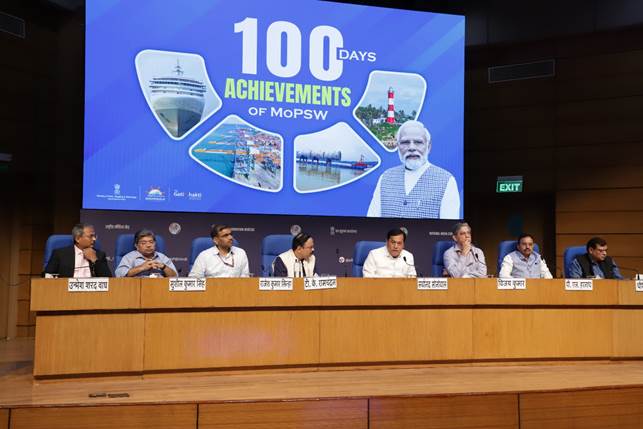
The event began with a detailed address by the Secretary of the Ministry of Ports, Shipping & Waterways, Shri T.K. Ramachandran, followed by the Minister’s remarks, both of which emphasized the Government’s proactive steps in revolutionizing India’s maritime infrastructure.
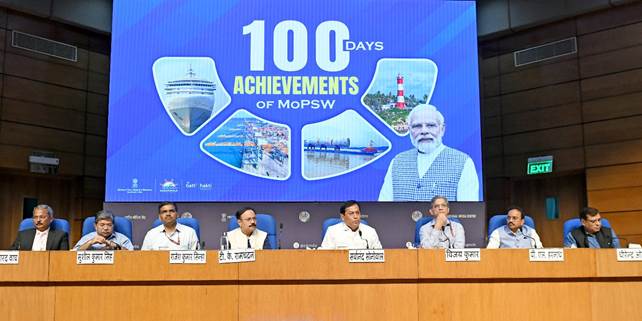
“Prime Minister Shri Narendra Modi Ji’s focus on holistic development and his mantra of ‘Transformation through Transportation’ are creating a paradigm shift in India’s maritime sector. This Government’s commitment to strengthening maritime infrastructure is paving the way for unprecedented economic growth and generating significant employment opportunities across the country. Waterways are becoming the new highways of India.”
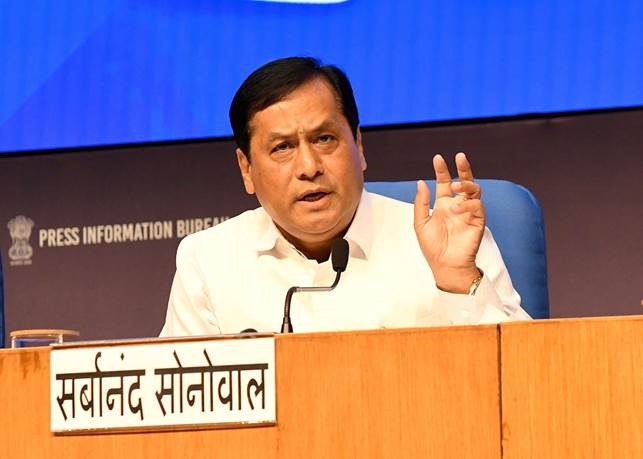
He further elaborated on the major initiatives taken by the Ministry under the guidance of PM Modi, highlighting that these are geared toward enhancing port infrastructure, improving ease of doing business, promoting sustainability, and creating employment opportunities.
This mega port is expected to create 1.2 million employment opportunities and place an Indian port among the top 10 container ports globally, significantly improving international shipping connectivity and reducing transit times and costs.
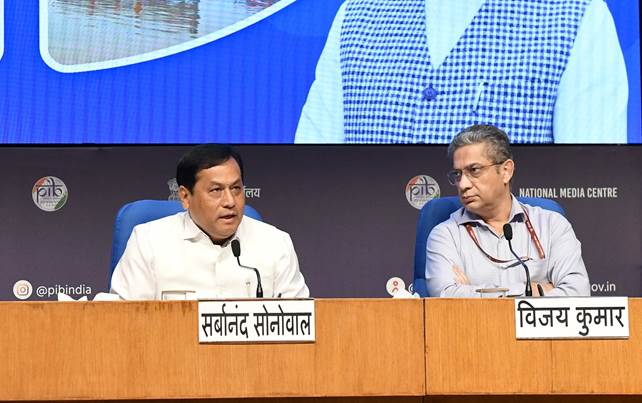
Another key project highlighted was the Tuticorin International Container Terminal on the East Coast, which will serve as a major transshipment hub, saving up to USD 200 per container and providing an estimated annual foreign exchange savings of USD 4 million.
The Ease of Doing Business Initiatives introduced several reforms, including the establishment of the Indian Maritime Centre (IMC) to foster policy and operational synergy, the Indian International Maritime Dispute Resolution Centre (IIMDRC) to streamline maritime dispute resolutions, and the Sagar Aankalan Guidelines to benchmark port performance, enhancing global competitiveness. Additionally, the commencement of operations at Cochin Shipyard’s International Ship Repair Facility (ISRF), equipped with state-of-the-art ship lifts and workstations, positions India as a global leader in the ship repair market.
The Ministry also successfully executed a landmark Deendayal Port Encroachment Drive, reclaiming 200 acres of encroached land for port-led industrial development. The performance of major ports has improved, with traffic increasing by 4.87% in 2024, and Visakhapatnam Port ranking among the top 20 in the World Bank’s Container Port Performance Index. As part of Greening Initiatives, the Ministry launched the Green Tug Transition Programme and allocated land for green hydrogen projects at Deendayal Port. In cruise tourism, the International Cruise Terminal at Visakhapatnam was operationalized, boosting both domestic and international maritime tourism prospects.
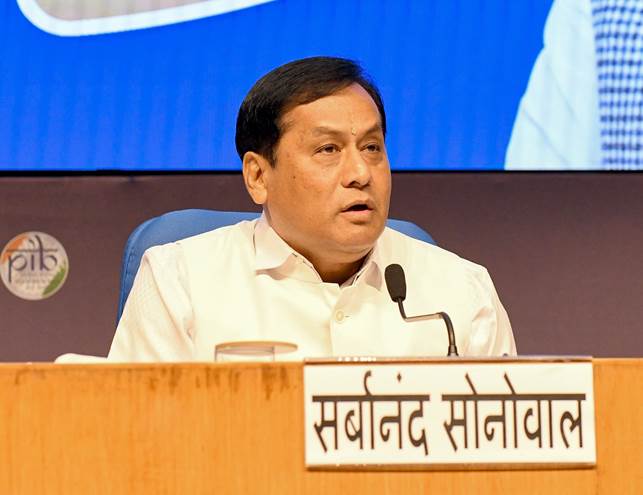
The Secretary of the Ministry of Ports, Shipping, and Waterways, Shri T.K. Ramachandran, provided a comprehensive overview of the Ministry’s strategic initiatives. He highlighted key reforms aimed at strengthening maritime infrastructure, driving investment, and enhancing ease of doing business.
“In the first 100 days of this Government, the Ministry has taken bold steps to implement key reforms, such as the establishment of the Indian Maritime Centre and the Indian International Maritime Dispute Resolution Centre, both of which will bolster India’s standing as a global leader in maritime infrastructure and logistics. We are on track to achieve the ambitious goals of the Maritime India Vision 2030 and Maritime Amritkaal Vision 2047, which focus on sustainable growth, enhanced connectivity, and improving the ease of doing business”, mentioned Shri TK Ramachandran, Secretary, MoPSW.
Shri Sarbananda Sonowal, outlined the Ministry’s upcoming priorities aimed at further enhancing India’s maritime sector. Key initiatives include the commencement of work on the International Container Transshipment Port (ICTP) at Galathea Bay, Great Nicobar Island, which will serve as a major transshipment hub. To strengthen India’s self-reliance in shipbuilding, the Shipbuilding Financial Assistance Policy will be expanded, along with the establishment of a Maritime Development Fund to boost domestic ship ownership. The Ministry is also set to enhance operational efficiency through digitalization with the EBS portal (Port Operating System), which will go live at five major ports, reducing logistics costs and streamlining operations.
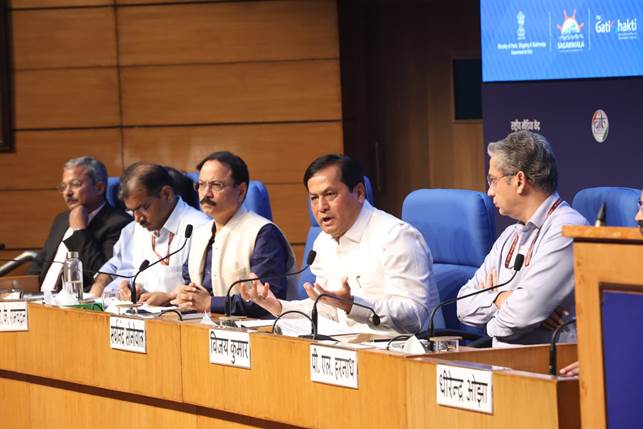
The notification of the Merchant Shipping Bill, incorporating international best practices for vessel safety, marine pollution, and maritime liabilities, was also mentioned, alongside the Coastal Shipping Bill, which seeks to foster a competitive coastal shipping environment, reduce transportation costs, promote Indian vessels, and integrate maritime transport with inland waterways.
On the sustainability front, the Harit Nauka scheme will promote the transition to green fuels for inland vessels, and hydrogen-powered vessels will be manufactured at Cochin Shipyard. Additionally, the Cruise India Mission will be launched to position India as a premier cruising destination, with the operationalization of the Mormugao Port cruise terminal in Goa to accommodate growing domestic and international cruise tourism.
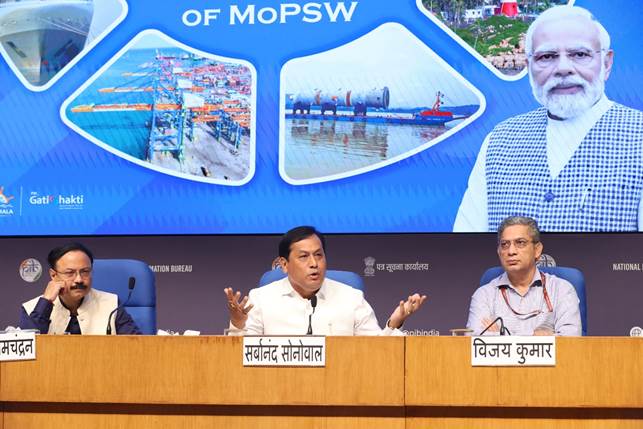
“As we continue our journey under the visionary leadership of Hon’ble Prime Minister Narendra Modi Ji, we remain committed to transforming India’s maritime sector. With our focus on enhancing infrastructure, ease of doing business, and sustainability, we are driving the country toward becoming a global maritime powerhouse”, added Shri Sonowal.
The Ministry of Ports, Shipping & Waterways is resolutely focused on achieving the goals set forth under the Maritime India Vision 2030. The efforts are directed toward ensuring sustainable growth, fostering innovation, and creating employment opportunities that will drive India’s maritime sector to global prominence.
The press conference concluded with a Q&A session, providing a platform for the media to engage directly with both the Minister and the Secretary.

